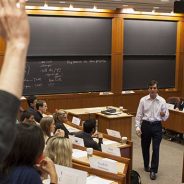Search results for :
2018 Trends: New York City’s MBA Future
It doesn’t take a stable genius™ to figure out that New York City is the world’s most highly sought-after 22.82 mi² strip of land to pursue an MBA.
As is the case with most prime real estate, the stakes are high and the competition fierce. For many prospective business schoolers, the decision to step into the gauntlet is one made with a healthy sort of trepidation.
Hefty price tags and cutthroat admissions present real barriers for prospective students and deter more than a few. Still, many equate the New York MBA experience to a dream scenario—or a Gordon Gecko-style fantasy, replete with the promise of a staggering salary, an attractive range of employment opportunities, and prime placement in a city of constant progress.
How does the dream stack up to reality? Schools weigh in on 2017 trends for graduates, many of whom report satisfaction with employment offers. Let’s take a look at how MBA graduates are getting the most of their newly minted degrees!
2018 New York City MBA Trends
Columbia Business School
According to the school’s most recent MBA employment report, less than 2 percent of Columbia Business School graduates reported salary as the primary reason for accepting an offer. While the honestly of that polling answer pool is debatable, Columbia School of Business is the king when it comes to starting salaries on our list, with median salary of $125,000. Of the graduating class, 93.2 percent of students accepted employment offers within three months. Approximately 28 of 1,019 total students stepped aside to create their own companies. Per the standard with many of the NY-area schools, the largest portion of graduates selected financial services (34.4 percent) as their field of choice, followed closely by consulting (33.1 percent) and media and technology (15.6 percent). Companies such as McKinsey & Company, Amazon, Goldman, Sachs & Co., and Morgan Stanley welcomed a majority of Columbia’s finest.
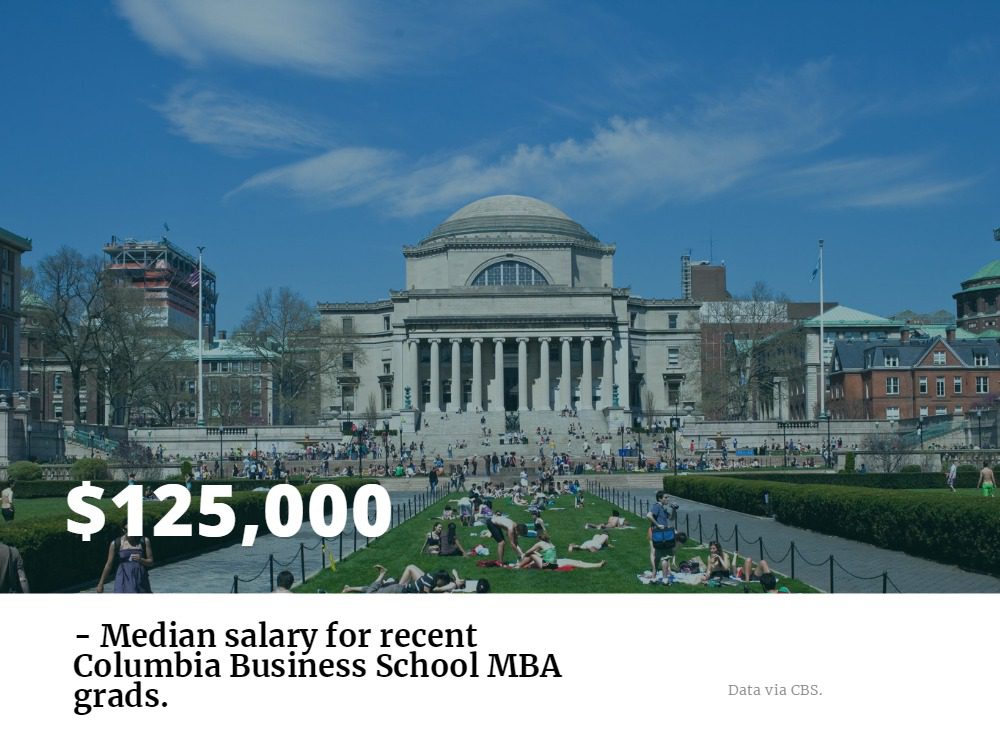
The boastful salary expectations, unsurprisingly, are tempered a bit by the costs of the CBS MBA program. The current estimated budget for Columbia MBAs comes in at $107,749 in the first year, of which includes over $21,000 for room and board. Tuition in isolation, however, costs $71,544 for the first year. Looking at a degree at any New York City school, never mind an Ivy League institution, means cost of living has to be taken in heavy consideration, which can vary greatly from borough to borough.
Fordham University’s Gabelli School of Business
About 88 percent of students in the Fordham Gabelli School of Business graduating class accepted employment offers within six months after graduation. Starting salary rates were below Columbia’s, at an average of $84,593, with an average signing bonus of $15,536 and additional compensation of $14,510. That average salary figure is an approximate 13 percent drop from the previous year’s reported averages.
Out of the many fields MBA students typically chose this year, Fordham students favored less predictable fields: just under 50 percent went into financial services, while 11 percent earning employment in consumer products, technology, and media, respectively. Unlike MBA graduates from many other NYC schools, however, only 5 percent of Gabelli students went into consulting, signifying a deeper trend of tech continuing its encroachment on MBA talent.
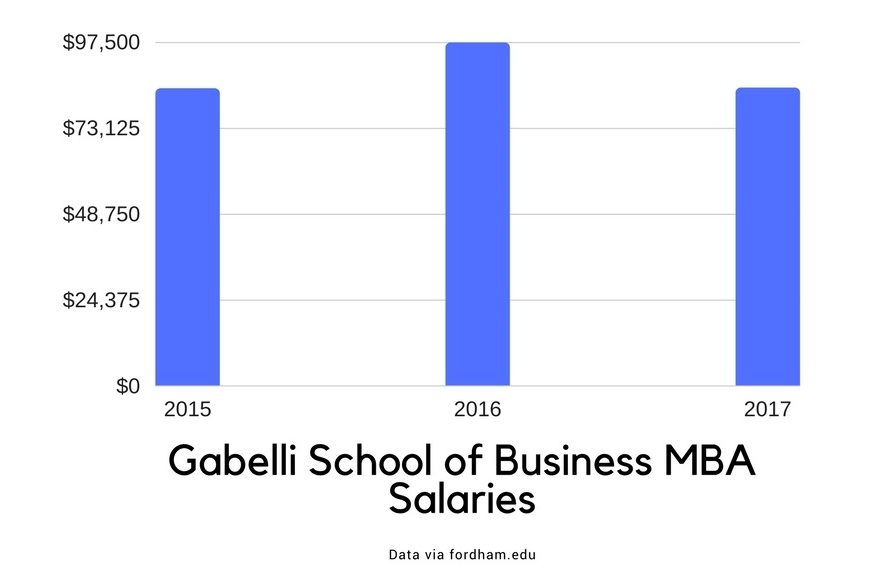
Compared to many other schools on this list, Gabelli’s distinct advantage is cost. The first year of the MBA program currently costs $49,645: more than 30 percent less than the cost of the Columbia full-time MBA tuition.
NYU Stern School of Business
This may shock you, but, NYU Stern MBA students are doing pretty well, with an average starting salary of $121,146 in placement of some of the most prestigious institutions in finance (32.4 percent), consulting (26 percent), technology (16.8 percent), real estate (3.5 percent), and retail (3.2 percent). Around 83 percent of those students landed jobs in the Northeast U.S., while nearly 10 percent of graduates found positions in Asia, Europe, and South America. Nearly half of all job offers were the result of an internship facilitated by NYU.
Like the trend at Gabelli, NYU grads jumping into tech has been steadily climbing over the past few years, rising from just 6 percent of employed grads from the Class of 2014, to 17 percent for the most recent class. The incremental increase coincides with the school’s recently added Tech MBA.
Stevens Institute of Technology School of Business
In a metro brimming with very successful business schools, the Stevens Institute of Technology School of Business separates itself with an incredible employment placement rate of 94.9 percent; the best placement among all business schools in the country, according to U.S. News & World Report.
The Stevens MBA faculty claim to provide “exceptional career services much earlier than other universities.” 90 percent were employed in the industry of their choice. Starting salaries fell between $88,805—$125,000. Companies such as Goldman Sachs, Protiviti, PwC ,and Prudential offered employment opportunities for these students.
Cornell University’s SC Johnson Graduate School of Management
About 93 percent of students from Cornell‘s Ithaca and NYC campuses received employment offers within six months of graduation. The average base salary was $125,578, which was an increase from previous years “driven by salary growth in consulting and finance.” Chosen fields for students were finance (38 percent), consulting (26 percent), and general management (21 percent). Out of the 122 companies that sought 2017 graduate students, the top recruiters were Citi Group, Amazon, Deloitte Consulting LLP, Ernst & Young, and McKinsey & Company.
Even Cornell MBA students in an internship were earning some of the best salaries in the country, pulling in a reported $8,764 per month. Those figures out over a 12-month rate are more than triple the average intern salary, according to Glassdoor data.
Cornell Johnson LGBT Community Helping Students Succeed
Cornell’s Johnson School of Management recently highlighted several of its LGBT student organizations and fellowships that actively challenge attitudes in the workplace and help LGBT MBAs feel more supported.
The article cites a 2013 Deloitte and Kenji Yoshino study entitled Uncovering Talent, which finds that 83 percent of LGBT employees covered their identities at work, a practice that “decreases employees’ loyalty and commitment to their organization.” Compare this figure to “79 percent of blacks, 66 percent of women, 63 percent of Hispanics, and 45 percent of white heterosexual men.”
“LGBT employees may feel conflicted if they have to lead double lives in fear of being passed over for a job promotion or fired for being who they are. Today, employers in 28 states can terminate workers for self-identifying as LGBT,” explained Reaching Out MBA (ROMBA) Fellow Brian Tsui, MBA ’18.
“People on the outside wonder about your status, and the LGBT person, whether out or not, can be constantly managing their image and behaviors,” adds Ryan Armstrong, MBA ’17.
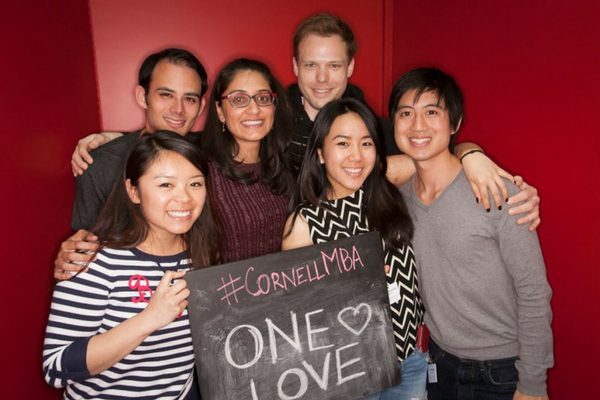
Photo via Cornell Johnson
In addition to the Out for Business student group, Johnson offers two fellowships in conjunction with ROMBA, a 20-year-old organization that helps students “find sincerely welcoming communities.”
“ROMBA was originally meant to build a stronger network of LGBT peers who would go into well-paid, high-powered jobs, and be able to look after each other as a network,” says ROMBA executive director Matt Kidd.
ROMBA promotes LGBT business school leadership and “provides information about the LGBT status of business schools worldwide, application and job prep and guidance, and conferences and treks to help students find environments that are right for them.”
”I’ve had many doors open because I had an introduction from someone within the LGBT community,” said ROMBA Fellow Sara Johnson, MBA ’18.
Tsui adds, “I found the courage to be proud and vocal after finding support at the annual ROMBA conference. LGBT alumni from MBA programs proved to me that I could be successful in my career and authentic at the same time.”
You can read more about the student organizations at Cornell’s SC Johnson Graduate School of Management here.
MBA on the Lake: Higher Learning in Chicago & Toronto
To have some type of natural source to balance out the cacophony of city life is crucial to a healthy mind. Not every major city is a concrete jungle, completely broken off from its former natural self or its surroundings. It might surprise city slickers the amount of wilderness opportunities that exist just outside their doorstep.
Take Toronto, for instance. Situated on the shoulder of Lake Ontario, Toronto is surrounded by plateaus, deep forest, ravines, and three rivers. While other Canadian cities may beg to differ, Toronto is the financial and cultural capital of the country. It has long been a hub for migration since the days of the Huron and Iroquois and houses the five largest financial institutions in Canada.
As the heart of American transportation and distribution, Chicago’s metropolitan reputation belies its abundance of natural splendors. Located at the toe of Lake Michigan, the Second City plays host to a wide array of green spaces—arboretums, nature centers, conservatories, and botanical gardens—as well as lakeside walking and biking paths.
Both Chicago and Toronto are world centers for higher education and research, yet offer resplendent surroundings to maintain a balanced state of mind. Both offer much more affordable living situations than New York or San Francisco and are highly underrated for their cultural appeal. Whichever you choose, you will find established, reliable education in your pursuit for the proper MBA. Last month, we analyzed the best part-time offerings in both metros, but let’s take a closer look at the full-time MBA options.
Our Favorite Toronto Full-Time MBA Programs
York University – Schulich School of Business
The Schulich School of Business at York University offers 18 MBA specializations. In addition to full-time programs, the school also accommodate working students with part-time programs that offer both day and evening courses. Students are also able to switch between full and part-time status during their tenure to suit their needs. In 2016, 89 percent of students were hired within three months of graduation by 140 companies. Graduates were employed with an average salary of $91,860 USD and an average signing bonus of $12,050.
McMaster University – DeGroote School of Business
DeGroote School of Business at McMaster University offers full-time and part-time options, as well as a three-year paid work term co-op schedule. Full-time applicants are required to have one year of full-time continuous managerial, professional, or technical work experience (this is where the Co-op plan can come in handy—work as you go). The school offers seven specializations and International study. About 94 percent of recent graduates were employed within six months (over the last two years) with an average starting salary of $71,930 USD.
Western University Canada – Ivey Business School
The Western University Canada Ivey Business School is technically located just outside of Toronto, in London, Ontario. The school offers a full-time program that gives students an opportunity to work with over 200 recruiters, with about 66 percent of graduates finding jobs in Canada. In 2017, 91 percent of the graduating class received a job offer by September 1. Average starting salaries were typically around $90,000 USD with an average signing bonus of $15,000. Other compensations averaged at $9,875.
CHECK THIS OUT: Kings of the North: Should You Get a Part-Time MBA in Chicago or Toronto?
University of Toronto – Rotman School of Management
Students in the Rotman School of Management full-time MBA program are offered 16 major options and more than 90 electives to allow for a very customizable experience. Between 2016 and 2017, 85 percent of full-time Rotman MBA students were employed within six months of graduation and 80 percent landed jobs just within three months. Average starting salaries were $85,000 USD with an average signing bonus of $13,500.
Ryerson University – Ted Rogers School of Management
MBA applicants at the Ted Rogers School of Management at Ryerson University are given two full-time options: the Global MBA or an MBA in the Management of Technology and Innovation (MBA-MTI). Their Global MBA program strives to help their graduates “understand the global context of various industries and have the knowledge necessary to drive innovation and deliver as capable and confident leaders.” The MBA-MTI helps students “gain the skills needed to manage within companies that are focused on tech and innovation.” Last year, about 80.3 percent of graduates found employment within three months of graduation and earned an average starting salary of $89,250 USD.
Our Favorite Chicago Full-Time MBA Programs
Booth School of Business – University of Chicago
The University of Chicago Booth School of Business offers what the school calls the “world’s most flexible MBA program,” and is regarded by U.S. News & World Report as the third best full-time offering in the U.S. The curriculum consists of 20 classes—nine mandatory and 11 courses tailored to personal interest—plus a Leadership Effectiveness and Development (LEAD) program. As of September 2017, an absurd 97.1 percent of graduates reported having received full-time job offers within three months, with 95.3 percent accepted offers in that time. Average starting salaries were an impressive $125,000 with an average starting bonus of $25,000.
Kellogg School of Management – Northwestern University
The Kellogg School of Management at Northwestern University offers two full-time MBA variations, either to be completed in one or two years. The school’s 2017 employment report, which can be downloaded here, detailed that 94.1 percent of graduates received job offers within three months and 90.8 percent of those grads accepted job offers. The average starting salaries for graduates with three-to-five years of work experience was an unsurprisingly lavish $128,686.
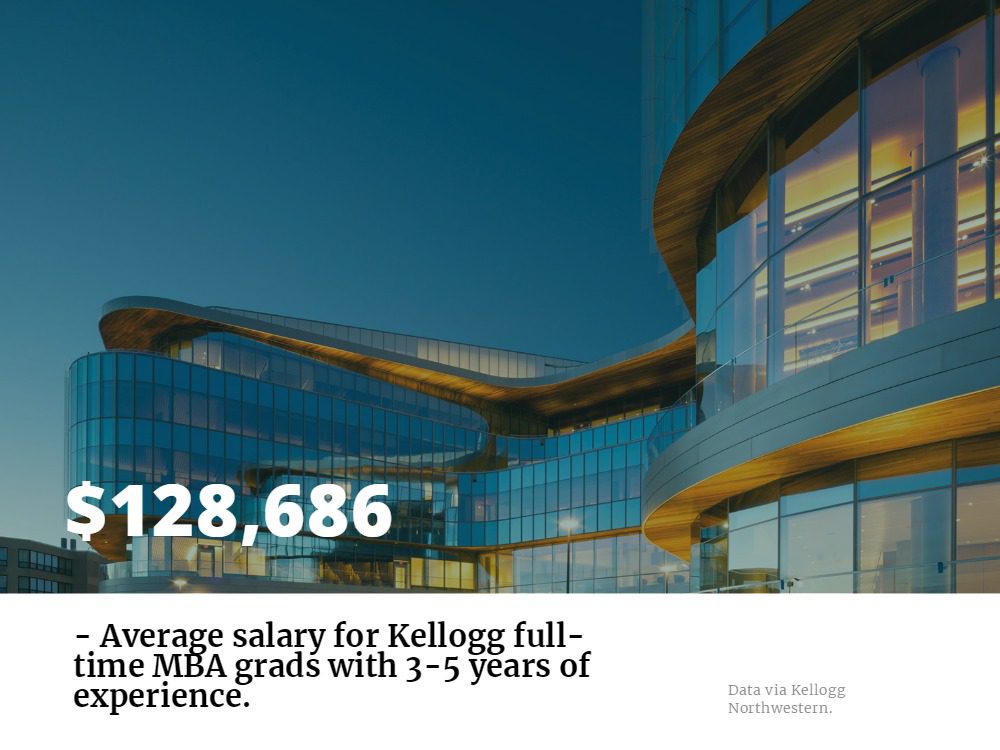
Like the Booth School of Business, when comparing Chicago and Toronto programs, financial gain is clearly an advantage for those who elect to study in the U.S. However, perhaps unsurprisingly, schools like Kellogg come with a steeper tuition cost. Applicants for the One Year full-time program should expect to pay more than $133,000 for the entire program, while those in the Rotman School of Management will have to pay around $75,000 USD.
Kellstadt Graduate School of Business – DePaul University
At the DePaul University Kellstadt Graduate School of Business, students can obtain a full-time MBA with the availability of 100 courses in 20 MBA concentrations and 17 specialized Master degrees. In 2016, within six months 89 percent of surveyed graduates were employed, 14 percent being entrepreneurial, contract or freelance. Average starting salaries were about $82,200.
Liautaud Graduate School of Business – University of Illinois at Chicago
The Liautaud Graduate School of Business at the University of Illinois at Chicago full-time MBA is a 13.5 course program, with six courses designed to deepened functional business knowledge, while the remaining 7.5 are geared towards allowing students to customize their experience towards their personal career interests. They provide twelve concentrations in their MBA program.
Mendoza College of Business – Notre Dame
The Mendoza College of Business at Notre Dame University offers two traditional full-time MBA options, which can be taken in two years, or just one in a more accelerated format. According to employment statistics recently released by the business school, about 88 percent of Two-Year full-time students were given a job offer within three months of graduating, with about 86 percent of those graduates accepting the offers. Like many of the major business schools located in the Chicago metro (although, yes, Notre Dame is technically in Indiana), full-time MBA grads enjoyed a lush base salary upon employment, with an average salary of $105,000 for the Class of 2017. Median signing bonuses also ranked in the higher end of the schools on this list, coming in at around $20,000.
The Mendoza College of Business is one of the many business schools in the U.S. that has seen a dramatic shift in terms of graduates moving into the tech industry. Three industries in particular dominated when it came to employing Mendoza MBA grads: tech, financial services, and consulting. However, a slim majority (24.7 percent) joined the tech industry, enjoying salaries slightly higher than the Mendoza average, coming in at $110,000.
Quinlan School of Business – Loyola University
The Quinlan School of Business offers full-time MBA offering is one of the most affordable high-quality Chicago options out there, with the most recent full-cost of the program coming in at $73,422; comparable to many of the aforementioned Toronto programs. And unlike many of the programs on this list, Quinlan isn’t located in some quaint suburb. Rather, the school is centered right on the historic Magnificent Mile in Chicago, fully integrated into the vibrant city.
Admissions Tip: Helping You Choose Your Business School
Deposit deadlines for Round 1 decisions are looming, many successful applicants are facing the enviable—but often agonizing—decision of choosing between programs. Though we know that those of you in this position will already be juggling an overwhelming amount of information about the schools on your short lists, we wanted to offer a few pointers to consider as you identify and evaluate the most important facts and factors in choosing between business schools.
Immerse yourself.
If you have not yet visited campus, go to the school and see what you think of the environment. Be sure to attend classes, talk with students, tour the facilities, and so on. Even if you have already made the trip, it’s a good idea to attend the school’s events for admitted students to meet your potential classmates. After all, these are the folks whose thoughts you will be hearing in class for two years and who will making up your future network.
Consider your immediate priorities.
Think about the location, size, teaching method, etc. Are you looking for a close-knit, “we’re all in this together” sort of experience, or would you prefer to attend classes and then disappear into a large city with a few classmates or old friends? Do you need the benefits of a large university to pursue coursework in a specific field? Do you crave lengthy discussions with faculty? Do you have family or a significant other who might need to consider your location? Are you strong in qualitative areas but looking to refine your skills in quantitative subjects? Is there a teaching method that might better address your weaknesses or best suit your learning style? Reflecting on the relative importance of each of these questions might help you to organize your thoughts about and the information on each program.
Look farther forward.
In addition to the experience you would have as a student, try to get a sense for the school’s track record in your target field. For example, if you hope to become a strategy consultant after school, take a look at each program’s placement statistics with the firms that are of interest to you. Talk to the career management office and find out which firms came to campus and how many offers were made. You might also try to contact alumni who work in your target field and see what they have to say about their alma mater’s strength in that area. A final option is to approach the HR departments of the firm you are likely to target and ask for their opinion of the programs on your list. This is also a nice excuse to build rapport with a potential future employer.
Think big.
Beyond the job you hope to secure immediately after school, consider the program’s regional and global brand. For example, if you are looking for work in London, you might investigate whether the school in question has an active alumni club in that city. Meanwhile, if you dream of working in Los Angeles but are debating between two programs on the East Coast, it might be important to determine which has the greater West Coast presence.
Do some quick analysis.
Two years ago, we launched MBA DecisionWire. This tool allows you to do searches on each of the schools at which you have offers, and see the decisions of your predecessors. When you have made your final decision, please head over to MBA DecisionWire, and add your entry; this will help future MBA candidates as they seek out their best MBA program options.
These are just a few general tips to get you thinking about how to make your b-school decision. It goes without saying that this is a once in a lifetime decision, so it certainly makes sense to do your homework and fully understand the strengths and weaknesses of each of your options. Rankings are a good starting point for a school search but should not be the deciding factor. Reading in-depth, independent reports on each program can be helpful, so be sure to check out the Clear Admit School Guides for their extensive cross-school comparisons on placement, class composition, campus life and more. Another thing to remember that the shoe is finally on the other foot, and the schools are now the ones marketing themselves to you. Be sure to take advantage of their offers to answer any questions you may have.
This article has been edited and republished with permissions from our sister site, Clear Admit.
Why Amazon Keeps Hiring MBAs
Editors Note: This article on Amazon hiring MBA students is an updated version of the original.
When thinking about the largest tech sector companies in the world, Apple, Microsoft, Facebook, Google, and Amazon are sure to top the list. Not only are these companies on the forefront of technological advancement in business and consumer electronics, they are also major players in the MBA job market.
Of all these notable heavyweights, Amazon is the biggest employer of graduates from elite business schools. According to the U.S. News & World Report’s top 20 rankings (from schools that release company-level hiring statistics), the e-commerce powerhouse hired more than twice as many top MBAs in 2016 as Microsoft, the next biggest tech employer. And with the upcoming development of HQ2, the company’s second headquarters, demand for MBA-level talent is sure to increase at the ever-expanding ecommerce giant.
Amazon—a company that offers online retail, cloud computing, mobile devices and media streaming services—has plenty of workforce needs. According to its annual report, Amazon has 230,800 full- and part-time employees. According to QZ, the company currently lists almost 17,000 open jobs among its corporate positions.
Why Is Amazon Hiring MBA Students?
Across all industries, Amazon is the fifth-largest employer of graduating MBAs, according to data on more than 200 full-time MBA programs collected by Bloomberg Businessweek. Amazon is also No. 4 on the 2013 Universum list of most popular MBA employers, up from No. 8 in 2011 and No. 6 in 2012.
Why the focus on hiring top MBA talent? Miriam Park, director of university programs at Amazon, told the Financial Times:

Miriam Park
“The Amazon recruitment process is designed to ensure we hire top candidates with high-growth potential whatever their background may be. As part of this we recruit current MBA students and MBA alumni for permanent and internship opportunities worldwide and see MBAs as an important part of our leadership development. We value people who can balance long-term strategic thinking with tactical execution, and who have the ability to make data-driven decisions.”
She added:
“We value MBAs for, in many cases, the global approach that they can bring to the business with many candidates having worked and studied in more than one country. Their range of experience and variety of backgrounds is invaluable in bringing a different way of looking at our business. We also value the analytical skills that they develop through their MBA. In fact, many of our senior leaders started at Amazon after completing MBAs.”
Which Potential Paths Leads to Employment at Amazon?
The best way that an MBA can get in with Amazon and end up with a job is to apply for an internship. Amazon also offers an MBA program that intends to create a pipeline from top business schools to actual jobs within the organization. Amazon offers several full-time opportunities to MBA interns. Each role lasts 11 to 12 weeks and provides students the opportunity to complete function-specific projects.
The company also offers a robust 8 to 12-week summer MBA internship that gives participants the opportunity to hone their decision-making ability in real-life consumer, finance, HR, technology businesses and operations environments. According to CNNMoney, Amazon’s summer internships host more than 170 interns from more than two dozen business schools each year.
What Kind of Jobs Can I Get at Amazon with an MBA?
As CNNMoney outlines, MBAs at Amazon may end up in any number of roles, whether it’s launching new products, finding ways to optimize the customer experience or evaluating the company’s future business investments.
Park discussed specific jobs that are offered to MBAs with the Financial Times. In terms of potential career options for MBAs at Amazon, she outlined participation in the Consumer Leadership Development (CLD) program, Pathways program for operations managers and Senior Financial Analyst (SFA) development program, as well as the role of senior product manager.
CLD is a three-year leadership development program in which MBAs rotate through two different roles from a choice of areas such as vendor management, in-stock management, marketing management, merchant management and/or retail product management. The goal of the program is to provide MBAs with a path to leadership roles at Amazon. Participants develop an understanding of the key roles within retail and become effective managers.
Pathways is a three-year, field-based program based out of warehousing and shipping centers for merchant goods and customer service sites. This is a position in which MBAs will have to develop leadership ability to complete fulfillment center and customer service operations.
SFA is a three-year leadership development program in which senior financial analysts are expected to evaluate and quantify new business ideas and perform data-intensive analyses to improve the way Amazon serves its customers.
Senior product managers work with technology teams to drive ideas from conception to execution, develop business models and marketing plans, define and analyze success metrics, manage strategic projects and own the product end to end. This job offers an inside track to future roles as general managers responsible for running large business segments.
How Can We Respond To A Crisis Better? An MIT Alum Has a Few Suggestions
In the wake of Hawaii’s false emergency threat last week, MIT Sloan recently discussed the two key lessons that will make countries more “efficient when responding to a crisis.”
Miyamoto International’s Elizabeth Petheo (MBA ’14) whose career has focused on international urban disaster and risk reduction and resiliency programs believes that countries in which disasters occur should drive resiliency efforts, but “international actors can act as a catalyst for knowledge transfer.”
Petheo explains that the national actors “who know the area best, understand what capabilities their community already has, and what needs to be strengthened” are the ones who need to drive the conversation. She advises communities to develop a checklist of sorts and ensure they have firm handles on questions related to the necessary equipment, whether there’s a control structure in place to make decisions, “who else in their ecosystem will be respond to disasters, and how their specific work area impacts other areas.”

Photo via Caleb Jones/AP
Part two of disaster relief involves the perspectives—and efforts—of the international community, which are necessary for communities to “understand links—how different actors who respond in a time of crisis can help and support each other,” according to Petheo.
Miyamoto, for instance, uses data to “help local first responders understand what different scenarios would be if an earthquake did strike their area, then help communities identify the gaps in their readiness and what areas could be strengthened.”
“To prepare for a crisis, there are a number of questions that communities can ask themselves. ‘This is not an exhaustive list,’ Petheo said, ‘but there are a couple of different buckets: the logistical and operations side of things; overall administrative management of how things get executed; and the players themselves.'”
Petheo concludes, “There is the economic, societal, social, and individual impact that’s happening all at the same time, which is what makes these kinds of emergencies so complex [but] the more you can think through what possible scenarios would be, what the situation that the community or government face would be, the better they are in coping when a crisis actually happens.”
Check out the recent of MIT’s article on disaster relief here.
More Harvard MBAs Are Turning to Politics
There’s no doubt that politics and public service have been hot topics since the November 2016 election. These subjects have dominated news stories and talk shows across the country. And, according to a recent report by the Wall Street Journal, politics and public service are also moving up as career choices for graduates from Harvard Business School (HBS).
Around 40 Class of ’17 HBS MBA graduates launched careers in government and nonprofits—twice as many as the previous year. Even though this represents just 4 percent of the program’s 900 graduates, it still suggests a growing interest in policy-making for business students.
Of course, business and government have always been closely connected, and it’s common for MBA students to aspire to public service and nonprofit involvement as part of their long-term career plans. The difference is that MBA graduates are starting to head into public service careers immediately after graduation. At least that’s what Matthew M. Segneri, an HBS MBA Class of 2004 alumnus, has witnessed.
Segneri, the director of the Social Enterprise Initiative at HBS, has noticed that graduates are increasingly considering careers in politics. In an article in the Harvard Crimson, he said: “Over the last 12 to 18 months, I’ve had a number of conversations with folks and seen a real uptick in the number of people who are thinking about local, state, and federal office.”
He went on to observe a change in the timing of these plans. “When you look at the prior generations of alumni there is more the tradition of learn, earn, and return—folks would go to school, have a successful traditional business career, and then later in life they would pursue public office or get deeply engaged in nonprofits and their communities,” Segneri said. “Today, there’s both an urgency and an understanding that it doesn’t have to be that way.”
There are many factors driving the surge in interest in politics. One is the simple fact that the United States elected a prominent businessman as president in the last election. Another is a trend of prominent business leaders being very vocal about politics in recent months, reinforcing the connection between the business and political realms.
For example, during the 2016 November election, Meg Whitman, the CEO of Hewlett Packard Enterprise Co., threw her support behind the Democratic candidate in New Jersey’s Fifth Congressional District race. And Carlos Diaz, a French entrepreneur in Silicon Valley, told the Financial Times that the tech industry has some responsibility for the 2016 election outcome.
YOU MAY ALSO LIKE: MBA Alumni Spotlight: HP CEO Meg Whitman
“The America that voted for Trump does not own a Tesla, nor an iPhone, and when it needs money, it does not ask business angels for help: it relies on bad credit,” Diaz said. “It is time to recognize that we need to develop technologies and businesses that will benefit the widest range of people possible, algorithms that do not divide but that bring together.”
So, it’s not a surprise that MBA graduates are heading into politics. In fact, more than a dozen Harvard MBA graduates have recently announced campaigns to run for local, state, or federal government.
Democrat Tim Keller, HBS MBA ’05, was elected mayor of Albuquerque, NM, last month while Republican Margaret Busse, HBS MBA ’01, recently announced her candidacy for the Massachusetts state senate. In addition, HBS MBA ’03 Sarah Amico is expected to announce her run for lieutenant governor in Georgia.
While Keller didn’t enter politics straight out of graduate business school, he understands why new MBA graduates are doing so. “In business school, what a lot of people do is say, ‘Oh, my second career is gonna be in public service. I’m gonna go into business, be successful, and then do public service,’” he told the Crimson. “What’s different all of a sudden is that people are opting out early, and they’re like ‘I’m gonna do this right now’ because they’re upset about something or fired up and want to make a difference.”
Adem T. Bunkeddeko, MBA Class of ’17, is currently running for Congress in New York’s Ninth Congressional District in Brooklyn—making him a perfect example of this phenomenon. Throughout his career at Harvard, Bunkeddeko maintained his connection to his local community and decided to use his business skills to better serve through politics. “At HBS we’re trained as general managers,” he said. “Understanding aspects of an organization, whether it be from the finance front or human capital, are important and useful skills that are actually quite lacking in public service today.”
And many other MBA graduates feel the same way. For Busse, who is running for the Massachusetts State Senate, the many case studies she read during her HBS coursework informed her desire to go into politics. “It’s really that ability to solve real-world problems that is needed in government today, that is needed in nonprofits today, and anywhere where people are trying to make a difference,” she said.
In addition, Busse sees widespread dissatisfaction with the current political climate as another reason MBA graduates are entering this arena. “I’m guessing a lot of people are feeling like me, frustrated with the current situation we have in politics today and feeling their skillset gives them a unique ability to help solve the problems we have right now,” Busse said.
In fact, that dissatisfaction led HBS MBA ’01 Daniella Ballou-Aares to recruit more HBS graduates into politics by forming the nonprofit Leadership Now with some of her fellow alumni. Developed after the 2016 election, Leadership Now recruits Harvard alumni and business leaders to run for office and helps to raise funds for their campaigns. After just a few months, the nonprofit already has the support of about 300 high-level business leaders.
Another example of HBS graduates encouraging public service is With Honor, which was developed by ’09 MBA Rye Barcott to support veterans running for office. In 2018, the organization plans to spend $30 million supporting campaigns for 25 to 35 congressional candidates.
In the end, Keller notes that the biggest motivation for MBAs to get into politics may be President Donald Trump. “Whether you like him or not, he is motivating. You’re either motivated against him or you’re motivated for him,” Keller said. “I also do think there’s just something about the millennial group that they’re not going to wait around.”
To learn more about how Harvard Business School facilitates students’ careers in politics, visit the school website.
This article has been edited and republished with permissions from our sister site, Clear Admit.
Top Schools Tackle Sexual Harassment, NFL Protests, and More
Should business schools teach ethics and social responsibility? In the past, top MBA programs stuck to a fairly typical curriculum: finance, marketing, accounting, economics. And while those topics still comprise the core of most MBA programs, they’re now only a part of the whole.
Beyond allowing MBA students to focus their studies in areas like entrepreneurship or technology, MBA programs are also taking on some of the most prominent ethical topics of the day, asking students to weigh in on current headlines and happenings. It’s the MBA ethics debate.
According to a United Nations group survey of business school students from around the world, students believe that ethics are a business’s most important responsibility. According to the report, “the exposure to, and teaching of, business ethics does not merely assist business leaders to resolve moral dilemmas. More importantly, it matures their proficiency in moral judgment and their ability to incorporate social issues in the decision-making process and assists them in implementing this in an all-inclusive manner.”
For example, last year a group of business executives—including the CEO of PepsiCo and head of General Motors—got together to dissolve two business councils that consulted with President Trump after insensitive remarks about the white supremacist violence that took place in Charlottesville, VA. And other executives such as the CEO of Patagonia, Yvon Choinard, have been vocal about political and ethical issues—even using their companies to take positions on social responsibility that would typically be considered outside the scope of business.
So, it’s no wonder many business schools have been making business ethics a more important part of their curriculum. The question is, “How should business ethics be added to the MBA curriculum, and how is it being added currently?” It depends on the school.
At Georgetown University’s McDonough School of Business, Professor Edward Soule teaches courses on business ethics, corporate social responsibility, and leadership. During these classes, he told the New York Times that he has assigned coursework covering a range of trending topics including sexual harassment at Uber, social justice protests by N.F.L. players, and how companies like Amazon have responded when attacked by President Trump.
“Something has changed,” Soule said. “I would be kidding you if I told you there wasn’t a different vibe in the classroom. Ethics and values have taken on more significance. It has to do with all of the things going on in this administration, often things that challenge our understanding of ethics and leadership.”

Students discuss the recent NFL protests in Prof. Ed Soule’s class at Georgetown’s McDonough School of Business. Photo via Justin T. Gellerson for The New York Times.
Georgetown McDonough is also home to the Institute for the Study of Markets and Ethics (GISME), a center that examines the ethical issues inherent in the functioning of a market society. Students, faculty, and researchers who participate in the center explore ethical questions as they relate to business and bring ethical considerations to bear on policy decisions regarding the regulation of markets. These are especially salient issues for Georgetown McDonough given its Washington D.C. location.
“At the McDonough School of Business, we have developed a method of teaching business ethics that includes normative experiential learning, communicates in terms readily understood by business students, and involves actual ethical decision-making on the part of the students,” Michael Douma, assistant research professor and director of GISME, said in a news release. “We have found that our approach results in students being more invested in the course and more committed to resolving ethical issues that confront them in a business environment.”
Another example can be found at Carnegie Mellon’s Tepper School of Business. According to John Hooker, a professor of operations research and business ethics and social responsibility, ethics has been a part of the Tepper School curriculum since the 1990s. “Our program was apparently the first to introduce the topic (1966), as part of a course on business law,” Hooker told us. “The ethics presence has gradually increased over the years, but we ethics faculty often have to fight for it. My view is that a required ethics course should be part of the picture.”
And Leanne Meyer, co-director of the Accelerate Leadership Center at the school, told the New York Times, “There’s a turning point in what’s expected from business leaders. Up until now, business leaders were largely responsible for delivering products. Now, shareholders are looking to corporate leaders to make statements on what would traditionally have been social justice or moral issues.”
As for ethics and MBA students, Tepper’s core offering in Ethics and Leadership is one of the only second-year courses it requires its students to take. The course teaches students how to foster their ability to reason and how to handle the ethical implications of managing organizations and people.
“The basic lesson for MBA students is that business ethics is not optional,” explained Hooker. “It is the basis for the social infrastructure that makes business possible, much as engineering is the basis for physical infrastructure. It requires careful analysis and training, no less than engineering or finance. This is why we need a stand-alone ethics course. Business ethics training teaches us to do ethics with our brains rather than rely on gut feelings. Otherwise, we have no way to reach consensus on the ground rules.”
In the end, there are many options for MBA students interested in ethics, though ultimately it up to the students themselves to raise topics that are pressing to them. “Ethics courses often focus on the hot topics. This stimulates discussion and raises course ratings, but it generates more heat than light,” said Hooker. “I focus on issues that students themselves raise. I also emphasize cross-cultural ethics, because business is global, and norms vary enormously around in the world. U.S. students typically have little awareness of this.”
Whether through case studies, guest speakers, simulations, competitions, or another initiative, the leading MBA programs dive into business ethics and corporate responsibility using a range of approaches. To learn more about Professor Hooker’s approach to ethics, you can check out his blog: Ethical Decisions.
This article has been edited and republished from our sister site, Clear Admit
2018 Trends: How Much Can You Get Out of a Boston MBA?
Boston, the largest city in New England, is often considered the academic, economic, and cultural center of the Northeastern United States. Beantown is also considered one of top college towns in the country thanks to its numerous esteem colleges and universities. Lots of that talent sticks too: Forbes ranks the city as one of the best places for business and careers. Continue reading…
The QS World MBA Tour Is Coming To These Select Cities
There are few better opportunities to learn about the exemplary business school opportunities than at an MBA fair. And luckily, for many prospective MBA students, that opportunity will soon be arriving in their city with the QS World MBA Tour.
How the Penn State MBA Became a Bloomberg Businessweek Favorite
In one of the most remarkable leaps in the history of Bloomberg Businessweek’s annual U.S. business school ranking, the Penn State Smeal College of Business jumped from 37th to 25th in just a single year: the largest leap for any school in the ranking.
Northwestern Students Embrace Human-Machine Intelligence In Studies
Attention prospective MBAs: Adam Pah, clinical assistant professor of management at the Northwestern University Kellogg School of Management in Chicago, has some news for you that sounds straight out of a sci-fi movie. Pah believes that “artificial intelligence and machine learning are eating software” and business students need to understand how and why. Continue reading…
What Should You Study? Finance vs. Marketing MBAs
George Harrison, in his final album Brainwashed, has a line in a song that goes, “We pay the price with a spin of a wheel / with a roll of a dice / Ah yeah, you pay your fare and if you don’t know where you’re going / any road will take you there.”
Comparing The U.S. News Full-Time and Online MBA Rankings
When it comes to business school rankings, U.S. News & World Report issues one of the most comprehensive annual lists. The annual rankings includes separate lists for the “Best Business Schools” and the “Best Online MBA Programs,” but deciding which format is right for you can still be tricky. Continue reading…
Executive MBA in Healthcare Administration
CU Denver Business School Executive MBA in Healthcare Administration Program Structure
The two-year Executive MBA in Health Administration is designed for working health professionals who seek a business edge to lead the field in healthcare management. The program is designed for professionals with at least three years of experience in the industry, and they are able to complete the two-year program while continuing to work full-time, without any career disruption.
The program begins in July of each year and starts with a one-week, on-campus component to introduce the designated courses. After the one-week introduction, students return home to complete the rest of their instruction online over the course of the next nine weeks. This process repeats each July and January over two years.
Curriculum
The hybrid on-campus, online program follows a strict curriculum over the course of two years. To graduate, students must complete 48 credit hours, comprised of 18 courses. The program begins with the fundamentals of business healthcare and courses evolve to teach students how to effectively become leaders in their field. Students can choose elective courses as soon as the end of the first year. Courses include Management Accounting in Healthcare Organizations, Health Sector Supply Chain Management, Healthcare Strategic Management, Managing Physician Relationships, International Health, and Ethics and Health Law.
Class Profile
Students in the Executive MBA in Health Administration have approximately six to 10 years of high-level managerial work experience.
Careers
Each student is assigned a dedicated career advisor at the beginning of their first year. Denver Business School notes that 80 percent of MBA students attend business school to make a significant career change of some kind, and the advisors are there to guide each student through that process. In addition, the school offers workshops throughout the duration of the 11-month program. Workshop topics include Targeted Networking, Negotiating Offers, Identifying & Articulating Your Skills, and many more.
The school takes advantage of its prime location in the heart of downtown Denver, just blocks from hundreds of thriving businesses. The Speaker Series brings industry professionals to campus to discuss industry-specific expertise, while business collaborations allow students to partner with local businesses to complete projects and practice solving real-world, current issues in their own city. Upon graduating, Denver Business School sees its students go on to hold positions in a variety of different industries, nearly evenly spread through sales & marketing, finance & accounting, information technology, start-ups & entrepreneurship, consulting, and nonprofit work.
Tuition, Scholarships, and Financial Aid
Tuition is currently $59,000 for the entire program. This fee covers tuition, textbooks and course materials, lunches during on-campus sessions, and continental breakfast. Students are automatically considered for scholarships from groups like the American College of Medical Group Administrators, upon application.
Admissions
Applicants to the Executive MBA in Health Administration must submit a completed online application form, two official transcripts from all institutions attended, a professional résumé, a self-evaluation essay, three letters of recommendation, and a TOEFL or IELTS, if applicable. Telephone interviews are required of applicants, and the admissions staff will contact students to arrange.
No GMAT scores are needed to apply to the program, but a minimum of five years of work experience in a healthcare industry profession is needed.
Applications are due May 30 for that year’s July start and October 31 for a January start.
Health Administration MBA
CU Denver Business School Health Administration MBA Program Structure
The Health Administration MBA is designed for health professionals looking to expand their skill set into the business world and distinguish themselves in their field. Completed at a student’s own pace, the program can be taken either part-time, online, or full-time. The program can be completed within two years, or as long as five years.
Classes are held either one or two evenings a week on campus, meant to allow students to continue working full-time. There is a selection of courses that can be taken online, minimizing students’ required travel time.
Curriculum
The 48-credit hour program is extremely structured, but students do meet with advisors at the start of the program to determine an individualized schedule to best fit with the demands of the program and the personal schedule of each student.
Twenty-seven credit hours are dedicated to core courses, 12 for health administration core course, three for a health administration information technology elective, and three for the healthcare administration electives.
Students take a mix of business, health, and information technology courses including Financial Management, Legal and Ethical Environment of Business, Health Care Systems, Fundamentals of Health Information Technology, and Quality and Process Improvement. Additionally, students have the option of tailoring their career by completing a specialization in one of three areas: International Health Management and Policy Specialization, Financial Management Specialization, or Health Information Technology Management Specialization.
Careers
Each student is assigned a dedicated career advisor at the beginning of their first year. Denver Business School notes that 80 percent of MBA students attend business school to make a significant career change of some kind, and the advisors are there to guide each student through that process. In addition, the school offers workshops throughout the duration of the 11-month program. Workshop topics include Targeted Networking, Negotiating Offers, Identifying & Articulating Your Skills, and many more.
The school takes advantage of its prime location in the heart of downtown Denver, just blocks from hundreds of thriving businesses. The Speaker Series brings industry professionals to campus to discuss industry-specific expertise, while business collaborations allow students to partner with local businesses to complete projects and practice solving real-world, current issues in their own city. Upon graduating, Denver Business School sees its students go on to hold positions in a variety of different industries, nearly evenly spread through sales & marketing, finance & accounting, information technology, start-ups & entrepreneurship, consulting, and nonprofit work.
While these services offered are the same as the One-Year MBA, Health Administration MBA students also receive more tailored advising that applies more directly to health-focused services.
Tuition, Scholarships, and Financial Aid
Denver Business School Healthcare Administration MBA tuition for Colorado residents is $626 per credit, and $1,378 per credit for non-Colorado residents. Out-of-state students only taking courses online pay $731 per credit. Over 48 credits, this total comes to:
• $30,048 for Colorado residents
• $66,144 for out-of-state residents
• $35,088 for out-of-state online-only students
Estimated total costs increase with additional fees, plus cost of books and other materials.
Students in the program may be eligible for the Dean’s Super Merit Scholarship, which is offered to students that score a 680 or higher on the GMAT, as well as the MBA Outstanding Scholarship.
Admissions
Applicants to Denver Business School must submit a completed online application form, GMAT scores with a minimum of a 500, official transcripts from all institutions attended, a professional résumé, personal essays, two letters of recommendation, and a TOEFL or IELTS, if applicable. Personal interviews may be required of applicants, and the admissions staff will contact students if they are selected for an interview.
GMAT waivers are admitted for select applicants. There is no minimum work experience requirement in order to apply.
Admissions deadlines are as follows:
-
Fall: April 15
-
Spring: October 15
Executive MBA
CU Denver Business School Executive MBA Program Structure
The CU Executive MBA is a flexible, rigorous program designed to be completed in less than two years while still working full-time. Over the course of two nine-month academic calendars that begin each September, classes meet every other weekend on both Friday and Saturday. Each class day is broken into a morning and afternoon session of three-and-a-half hours each, with a break for lunch. The program is typically completed in 21 months.
There are multiple versions of the same EMBA program, provided at all three of the Colorado University campuses.
Curriculum
In addition to eight consecutive class terms, the EMBA also includes professional modules and experiential learning opportunities. After term 2, the class travels to Northern India for their first of two global immersion trips, followed by an Executive Development Workshop. After two more terms, the class travels to China for the second global immersion trip and follows the trip with professional development days, and then two more terms. Prior to term 7, students partake in the Global Context of Business Executive Workshop, then the final eighth term, and another Global Business Experience trip. This combination of classroom work, experiential learning, and two-week breaks between classes while maintaining a full-time job allow students to constantly apply their academics to real-life business issues.
Class Profile
An estimated 130 students are enrolled in the CU Denver School of Business EMBA program.Students in the program are, on average, 39-years old, have 18 years of previous professional work experience, and 14 years of previous management experience. The average class size features 28 students.
Careers
Departing from traditional MBA career services, the CU EMBA partners with Right Management, a career optimization group with more than 30 years’ experience. Right Management’s approach focuses on a flexible, individualized career plan for each student. Utilizing professional career coaching, professional assessments, hands-on learning, proven resources, and interactive training, Right Management is able to offer EMBA students a level of career preparation fit for only the most experienced management professionals looking to customize their future.
Tuition, Scholarships, and Financial Aid
The current tuition for the 21-month CU Denver Business School Executive MBA is $10,250 over eight installments, totaling $82,000. This fee includes all tuition and fees, all course materials, morning and afternoon refreshments on campus, and travel and lodging during the required 10-day international business trip. Tuition is billed in eight equal installments of $9,950.
There are several options to help finance the EMBA, including employer support, business school grants, federal loans, and private loans. Additionally, the school offers limited numbers of scholarships: merit-based, not-for-profit, and affiliation scholarships.
Admissions
A completed application for the CU EMBA program includes a minimum of eight years of professional experience (though the school notes preference for ten or more), official transcripts from all institutions attended, two professional letters of reference and a self-recommendation, and a résumé. Students may submit an optional GMAT score, and the school notes that a GMAT is strongly recommended if the rest of the application is academically weaker. Interviews are required for all candidates before final selection, on an invitation-only basis.
Applications to the CU Denver Business School Executive MBA program are reviewed on a case-by-case basis throughout the year, depending upon the time in which they are submitted.
Deadlines
Fall
Applications due June 30
Spring
Applications due October 31
Professional MBA
CU Denver Business School Professional MBA Program Structure
The Professional MBA is one of the most popular of the MBA options at the Denver Business School, offering a flexible schedule that allows both full-time, part-time, and online students to complete the program at their own pace. Like the school’s accelerated full-time option, the program requires 45 credits to complete. Most students finish the program within two to three years.
Multiple dual degree options are also available with the CU Denver Business School Professional MBA, including an MS in accounting, business analytics, taxation, and much more.
Curriculum
Because the Professional MBA is self-paced, students create their own class schedule and complete their degree on their own personal timeline. Due to this highly customizable nature of the program, students are not members of a cohort and do not take classes with the same people each term.
Among the 45 credits required to complete the program, the bulk (30 credits) are comprised of core courses, with 12 credits worth of specialization/electives, and three additional credits worth for the international business course.
Part-Time MBA Rankings
• U.S. News & World Report: 74 (tie)
Class Profile
An estimated 440 students are currently enrolled in the CU Denver Business School Professional MBA program. The majority are male at 60.2 percent, with 39.8 percent female students.
These students are, on average, 31-years old an earned a 554 GMAT score, and a 3.4 undergraduate GPA. The overall acceptance rate of the program is 74.8 percent.
Tuition, Scholarships, and Financial Aid
Denver Business School professional MBA tuition for a Colorado resident is $626 per credit, and $1,378 per credit for a non-Colorado resident. Out-of-state students only taking courses online pay $731 per credit. Over 45 credits, this total comes to:
• $28,170 for Colorado residents
• $62,010 for out-of-state residents
• $32,895 for out-of-state online-only students
Estimated total costs increase with additional fees, plus cost of books and other materials.
Students in the program may be eligible for the Dean’s Super Merit Scholarship, which is offered to students that score a 680 or higher on the GMAT, as well as the MBA Outstanding Scholarship.
Admissions
Applicants to Denver Business School must submit a completed online application form, GMAT scores with a minimum of a 500, official transcripts from all institutions attended, a professional résumé, personal essays, two letters of recommendation, and a TOEFL or IELTS, if applicable. Personal interviews are not part of the admissions process.
GMAT waivers are available on a case-by-case basis.
Admissions deadlines are as follows:
Fall
Domestic Applications
- Priority: April 15
- Final: July 15
International Applications
- Priority: March 15
- Final: May 15
Spring
Domestic Applications
- Priority: October 15
- Final: December 15
International Applications
- Priority: September 15
- Final: October 15







